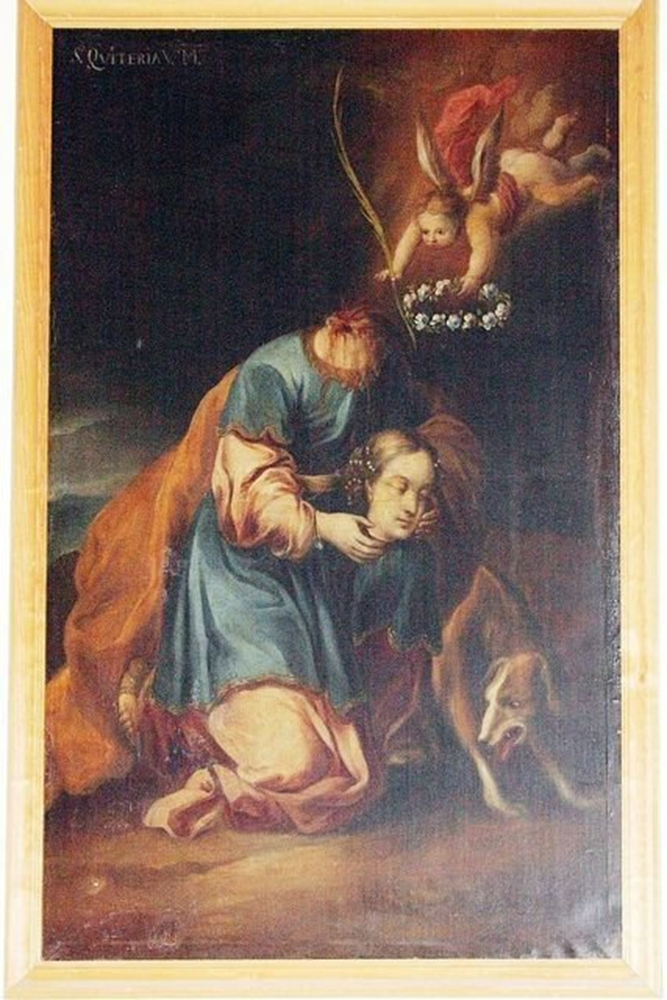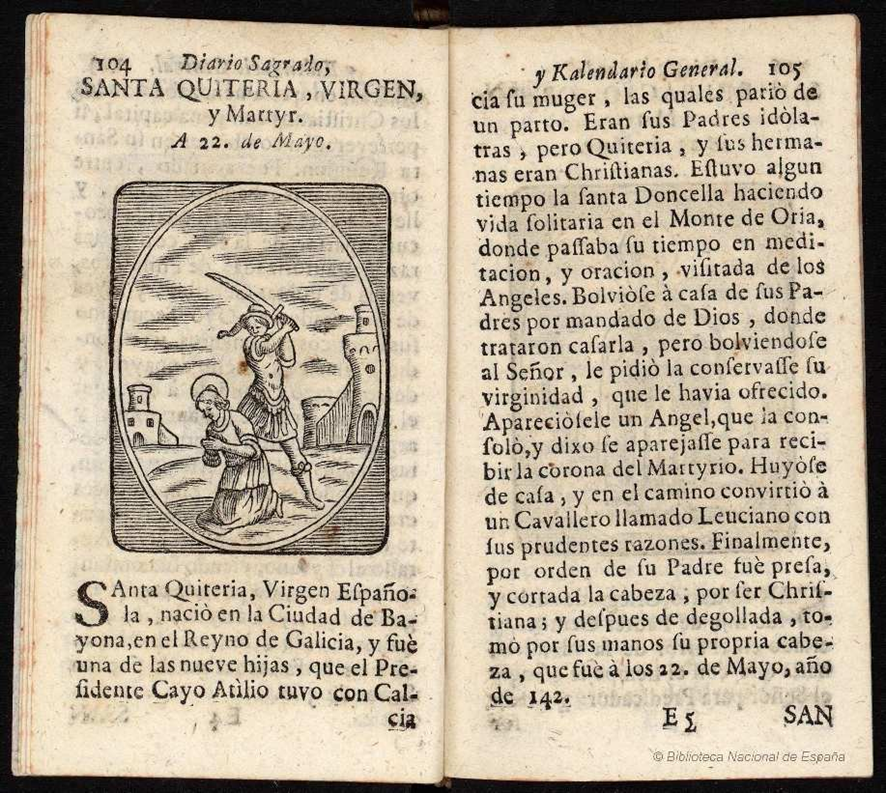After having his head cut off, Santa Quitéria's own decapitated body takes his head in his hands and walks to the neighboring city to be buried. Protective against rabies disease, madness and depression

No, you did not read it wrong. It was exactly that : the headless body of Saint Quitéria picks up her own head, already severed from the ground, puts it under her arms and walks away until she finds her tomb... Today we will learn about the story of the saint, protector against the disease of rabies, madness , depression and children who take a long time to start walking!
Quiteria was born in Bracara-Augusta (current Braga) in the year 120, Portugal - 2nd century. His father was the governor of the northwest of the Iberian peninsula, Lúcio Caio Atílio Severo . His mother, Calcia Severus , descended from the family of Emperor Julian. Therefore Quitéria was from a family of great nobility, but both were pagans.
Calcia was always sterile, never managing to get pregnant despite both of their wishes. However, shortly before the governor's trip to Terragona , he finally noticed that he was pregnant and decided that she would not accompany him, leaving her under the care of Cila, her trusted employee and lady. After the gestation period, she conceived nothing more, nothing less, than nine girls...
But this instead of being an immense joy for this barren woman, it disgusted her. She felt like an animal giving birth to so many children and they were all women (at the time boys were very valuable to a family). To make matters worse, she thought: how can she explain so many children to her husband? I would suspect treason...
You found the worst possible solution to your "problem." She asked Cita, the only witness to the birth, to drown the nine babies in the Este River (suburb of Braga) and tell the others that the children died during the birth procedures.
But God's providence was already in the path of these children long before. What Calcia didn't know was that Cita was a Christian and wouldn't have the courage to commit such evil. She kept his religiosity hidden from everyone due to the serious persecution of Christians at that time. She then took the children and instead of going to the river, he took them to the house of the local archbishop, Santo Ovídio, who immediately baptized them, gave them names and found several Christian families to raise them, supported by expenses covered by himself.
Thus, they all grew up under Christian teachings and guidance, which brought many fruits in their hearts to dedicate their lives to Jesus Christ. When they were older, the sisters decided to live together, as in a private "convent", under the approval of Saint Ovid himself, taking vows of chastity and charity. All in gratitude to God for freeing them from death at birth and providing them with a Christian education even in their childhood.
But the persecution of Christians did not subside, always incited by Emperor Hadrian. Until the fame of the charitable Christian sisters reached the ears of the Romans, capturing them and taking them to the presence of the governor in his palace. Lúcio Severo is impressed by the nine sisters and wants to know about their origins. One of them, Germana, without fear and a lot of courage tells him that they are Christians and her daughters, as well as the whole story of her mother's attempt to kill them at birth.

Saint Quitéria carrying his head next to a dog. Protective against rabies
He then asks to call his wife and the maid Cita to confirm the unbelievable story. They let them know all the details. There follows a moment of Lúcia's affection for her "new" daughters, showing them the nobility of the family they would become part of. Of course, to do so they would have to marry noble men from their circle and even more importantly: they would have to renounce the Christian faith.
Without fear, they all rejected the proposal. The governor gets angry and leaves the room, leaving them alone. Aware of the danger they were in, they began to pray, interrupted by an apparition:
An angel descends from Heaven and tells them to immediately leave the palace and flee.
Upon returning to the room, Lúcio does not find them and becomes aware of the young women's escape, enraging him even more. He sends his soldiers in pursuit of his daughters and manages to arrest only Quiteria back. The rest fled to different sides and each settled in different regions, mainly in Spain.
Although Lúcio now tried to be more flexible with his daughter's religiosity, he did not give up on her marrying a young nobleman called Germano. Ask your father for time to think.
As she retired in prayer, her angel appeared to her again, urging her to make another escape to Monte Pombeiro, where she would find a chapel dedicated to Saint Peter, in the Eufrásia valley. Escapes and settles in place. Soon other young Christian women began to live with her in the community. But they were reported and without wasting time Lúcio asked for the arrest of all local residents, leaving them in prison for three days without food, where supernatural events happened:
Our Lady appeared in the cell to support her. Mother Mary gave her a ring, promising that she would not lose her virginity and that everyone who prayed for her intercession for the cure of the disease of anger and fury would recover their health . From this moment on, other prisoners began to be cured of their illnesses through the intercession of Quiteria , including one sick with rabies. Furthermore, the young women evangelized and converted the guards in their cell!
Our Lady disappears, leaving her angel to watch over her. Immediately Quitéria miraculously finds herself out of prison after a bright flash that opens the prison doors and they begin to escape. But he asks the angel not to run out of water on the way, who answers:
"Wherever you want to drink water you will find a source that will never end and you will be blessed." And so it happened.
Germano personally stops in pursuit and comes across a little shepherd, asking if he had seen the beautiful young woman. He denies it but points with his finger where it was hidden... Germanus then cuts off Quitéria 's head, killing her at the age of 15 in the year 135 and making her a martyr . Tradition says that where the head touched the ground, another fountain of blessed water was born, still called "The fountain of Saint Quiteria".
The soldiers responsible for his arrest were immediately blinded. Dogs licked Quitéria's blood and hardened themselves, attacking the little shepherd with countless bites. The boy runs to wash his wounds in the fountain that gushed water for the saint to drink and was immediately healed!
And, the greatest miracle of all , according to traditions and legends passed down from generation to generation since the 2nd century (as with all other saints from the first centuries of Christianity):
After having his head cut off, his body takes his own head in his hands and walks to the nearby town, called Aufrasia . Wherever she stopped, she was buried by Christians.
Sanctuary was later built Saint Quiteria at the site, about 2 km from the current city of Felgueiras. There are also chapels that demonstrate all of the saint's steps.

Source: National Library of Spain - document from 1750
All eight sisters were also persecuted and killed in the territories of Spain, equally making them saints , namely: Santa Vitória, Santa Geneva, Santa Marciana, Santa Germana, Santa Liberata, Santa Eufemea , Santa Marinha and Santa Basilia. Many of the records of the history of Santa Quitéria came from the most abundant documentation of the history of her sister Santa Liberata.
References: IDE+, Santa Quiteria Huete, Rezai e Rezai, Santos e Beatos Católicos, Saints - Feast - Family, Prefeitura de Esmeraldas, Biblioteca Nacional da Espanha, Cultura - Revista de História e Teoria das Ideias